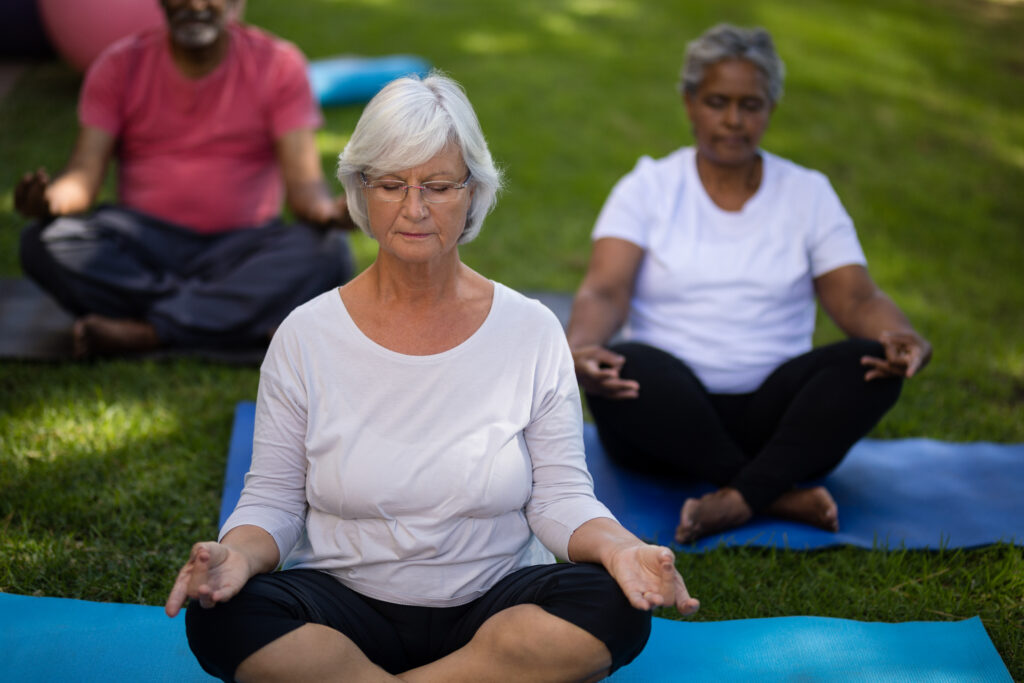
Menopause treatment options and tips
If you are struggling with menopause symptoms and finding they are impacting on your quality of life there are a few things you can try, including non-medical approaches and medical treatment (both hormonal and non-hormonal).
Non-medical approaches
Some people find that the following activities or alternative therapies can help them better manage menopause symptoms. A couple of caveats – not all have been proven to be effective in randomised controlled trials (the ‘gold standard’ of clinical research). They also can be out of reach financially for many women.
Therapies that have been shown in high quality clinical research to be effective are:
- Clinical hypnosis
- Cognitive behavioural therapy – either in person, in a group or online
Activities not backed by clinical research but which many people find helpful are:
- Acupuncture
- Yoga

Other lifestyle changes you may like to try (again, based on women’s lived experience rather than clinical trials), which could help in easing your symptoms are listed below. Even if they don’t help with your menopause symptoms, some will have other benefits for your health and wellbeing.
Changing what you eat and drink:
- Some women report that certain foods and drinks trigger hot flushes. If you identify such triggers, try avoiding those foods or drinks.
Adapting your environment:
- Managing your environment can help you to keep yourself cool. This could be wearing lighter and looser fitting clothing, drinking cold drinks, using a fan, adjusting the temperature of your bedroom at night, or keeping a window open.
Physical activity:
- Some women find physical activity helps with menopause symptoms – and of course it has many other health benefits.
Sleep:
- Sleep disturbances, often related to night sweats, can be a particularly challenging symptom of menopause. Putting in place routines around sleep might help. For example, relaxation techniques before bed, going to sleep and waking at the same time each day, ensuring your room is dark and cool, and avoiding naps during the day.
Stopping smoking before menopause:
- Evidence has shown that women who smoke cigarettes are more likely to have hot flushes, have more of them, and to have more severe hot flushes during menopause.
- While stopping smoking during menopause has not been found to help with symptoms, it is very beneficial for your health.
Medical treatment options for menopause
Medical treatment options available for women who are troubled by hot flushes and night sweats (also known as vasomotor symptoms) include Menopausal Hormone Therapy and non-hormonal treatment.
Menopausal Hormone Therapy is most effective in reducing the number and severity of hot flushes and improves vaginal dryness.
Several non-hormonal options that have been shown to be moderately effective in managing symptoms are also available. These include:
- Clonidine
- Certain anti-depressants
- Gabapentin
- Oxybutynin
When considering treatment options for menopause, speak to a doctor. The Australasian Menopause Society website has a list of doctors with specialist expertise in this area (as well as a Consumer Information section about all aspects of menopause).
Australasian Menopause Society (2017) Menopause what are the symptoms?
Australasian Menopause Society (2019) Lifestyle and behavioural modifications for menopausal symptoms.
Australasian Menopause Society (2022) What is menopause?
Alspaugh A, Im E-O, Reibel M, Barroso J (2021) The reproductive health priorities, concerns, and needs of women in midlife: a feminist poststructuralist qualitative analysis. Qualitative Health Research. 31(4): 643-653
Calvaresi E, Bryan J (2003) Symptom experience in Australian men and women in midlife. Maturitas. 44(3): 225-36
Cheung AS, Nolan BJ, Zwickl S (2023) Transgender health and the impact of ageing and menopause. Climacteric. 26(3): 256-262
Continence Foundation of Australia (2021) Who it affects
Glyde T (2021) How can therapists and other healthcare practitioners best support and validate their queer menopausal clients?. Sexual and Relationship Therapy
Haggan M (2019) Breaking the taboo: the real story of menopause. AJP: The Australian Journal of Pharmacy. 100(1181): 44-48
Health Talk Australia (2023) Early menopause experiences and perspectives of women and health professionals
Hickey M (2022) Normalising menopause. The British Medical Journal. 377(e069369)
Hoga L, Rodolpho J, Gonçalves B, Quirino B (2015) Women's experience of menopause: a systematic review of qualitative evidence. JBI Database System Rev Implement Rep. 13(8), 250-337
Lobo RA, Gompel A (2022) Management of menopause: a view towards prevention. The Lancet: Diabetes and Endocrinology. 10(6): 457-470
Magraith K, Stuckey B (2019) Making choices at menopause. Australian Journal of General Practice. 48(7): 457-462
Multicultural Centre for Women’s Health (2023) Menopause fact sheets in eleven languages
My Meno Plan (2020) What if I am transgender or non-binary?
North American Menopause Society (2023) Instant help for induced menopause
North American Menopause Society (2023) Urinary incontinence
Philpott L (2017) OTC: Women's health: a time for change: post menopausal health. AJP: The Australian Journal of Pharmacy. 98(1159)
Philpott L (2022) Menopause: supporting women in midlife and beyond. AJP: The Australian Journal of Pharmacy. 103(1213): 54-56, 58





